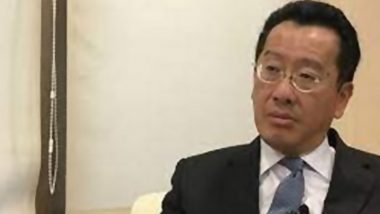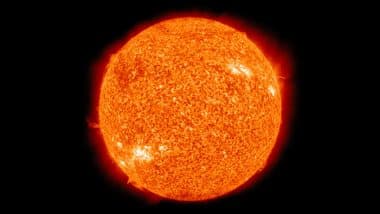Taipei, October 23: Taiwan's Defense Minister Wellington Koo stated on Wednesday that a Chinese blockade of Taiwan would be considered an act of war with serious repercussions for global trade, according to a report by Taiwan News. Notably, during its "Joint Sword-2024B" military exercises, China practised blockading key ports and targeting maritime and ground locations, according to reports from Taiwan.
Koo explained that while the drills outlined specific exercise areas, there were no designated no-fly or no-sail zones established. He said, "If a blockade is implemented, as defined by international law, it would involve preventing all aircraft and ships from entering the area, and under United Nations resolutions, this is considered a form of war." China Holds Live-fire Drills Opposite Taiwan, Week After Large-scale Exercise.
He emphasised the distinction between military exercises and an actual blockade, particularly regarding their implications for the international community. The report further stated that Koo highlighted that a Chinese blockade would significantly affect the global economy, noting that one-fifth of the world's freight transits through the Taiwan Strait, amounting to approximately NT$78.57 trillion (USD2.45 trillion).
He added, "The international community cannot simply stand by and observe."
On the same day, the Legislative Yuan's Foreign and National Defense Committee discussed potential Chinese blockade strategies, including grey zone tactics and the "python strategy." Additionally, Taiwan's agriculture ministry presented a wartime food plan to the Legislative Yuan on Tuesday to prepare for a possible blockade, indicating that it has secured rice stockpiles for over three months and organized food supplies nationwide to mitigate risks of attacks. Taiwan Accuses China of Launching Satellites over Its Air Defence Zone.
Koo also mentioned that the Taiwanese government is exploring measures to ensure the safe supply of industry, infrastructure, energy independence, essential resources for daily life, food security, and medical supplies. He noted that Taiwan faces daily cyber attacks, underscoring the need to strengthen information security defences.
Taiwan has operated independently since 1949, but China views it as part of its territory and demands eventual reunification, even by force if necessary.
Earlier this week, Taiwan President Lai Ching-te assured the public of the government's commitment to protecting Taiwan's democracy and national security in light of China's extensive military exercises around the island. His comments followed a high-level national security meeting in response to the announcement by the Chinese People's Liberation Army (PLA) regarding military drills, dubbed "Joint Sword-2024B," in the Taiwan Strait and nearby areas. These exercises were characterized as a "stern warning" to supporters of Taiwan independence, according to the Taipei Times.
(This is an unedited and auto-generated story from Syndicated News feed, LatestLY Staff may not have modified or edited the content body)













 Quickly
Quickly




















